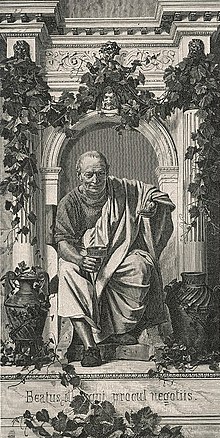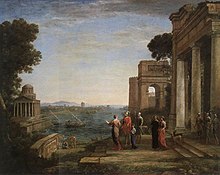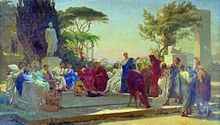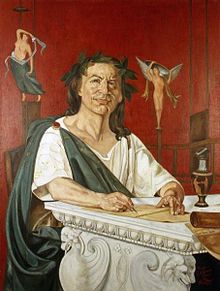John Conington
Appearance

And think each day that dawns the last you'll see;
For so the hour that greets you unforeseen
Will bring with it enjoyment twice as keen.
John Conington (10 August 1825 – 23 October 1869) was an English classical scholar.
Quotes
[edit]
- An inferior artist's only chance of giving pleasure.
- On rhyme. Preface to The Odes and Carmen Saeculare of Horace (1863), p. xi.
- Blank verse really deserving the name I believe to be impossible except to one or two eminent writers in a generation.
- Preface to The Aeneid of Virgil (1866), p. ix
- A critical sense of style and of poetic form is not easy to attain, nor is it of first importance for the younger, or, indeed, for any student of Virgil. Wide open to anyone who is willing to learn is the richer knowledge of Virgil as a poet who loved his country and who loved also that humanity which existed before Rome, exists today within ourselves, and will exist long after our own civilization, like that of Virgil's Rome, has become a matter of "ancient history." It is true that the longer one has lived the better one can appreciate a poem which is concerned with life. But the gain that comes to us with the years depends, partly at least, upon the riches we have been willing to extract from literature, which is the experience of other men and women written out. In youth's search for this treasure the Aeneid will be at once a fair haven and a port of departure.
- Introduction to The Aeneid of Virgil (Chicago and New York: Scott Foresman and Company, 1916), p. 45; partially quoted in School and Home Education, Vol. 35 (1916), p. 172
Commentary
[edit]P. Vergili Maronis Opera
[edit]- The Works of Virgil, with a Commentary by John Conington, M.A.
Volume I (1858)
[edit]- There are few writers whose text is in so satisfactory a state as Virgil's.
- Preface, p. xi
Volume II (1863)
[edit]Translations
[edit]
Seize the present; trust tomorrow even as little as you may.
- In the moment of our talking, envious time has ebb'd away.
Seize the present; trust to-morrow e'en as little as you may.- Book I, ode xi
- Ah! Postumus! Devotion fails
The lapse of gliding years to stay,
With wrinkled age it nought avails
Nor conjures conquering Death away.- Book II, ode xiv
- Death takes the mean man with the proud;
The fatal urn has room for all.- Book III, ode i
- No, trust the Muse: she opes the good man's grave,
And lifts him to the gods.- Book IV, ode viii
Book I
[edit]- So vast the labor to create
The fabric of the Roman state!- p. 4
- Then should some man of worth appear
Whose stainless virtue all revere,
They hush, they list: his clear voice rules
Their rebel wills, their anger cools.- p. 10

A pleasant tale to tell.
- Comrades and friends! for ours is strength
Has brooked the test of woes;
O worse-scarred hearts! these wounds at length
The Gods will heal, like those.- p. 12
- This suffering will yield us yet
A pleasant tale to tell.- p. 12
- Bear up, and live for happier days.
- p. 12
- She turned, and flashed upon their view
Her stately neck's purpureal hue;
Ambrosial tresses round her head
A more than earthly fragrance shed:
Her falling robe her footprints swept,
And showed the goddess as she stept.- p. 21

And hearts are touched by human things.

Compassion I have learned to show.
- 'Is there, friend,' he cries, 'a spot
That knows not Troy's unhappy lot?'- p. 23
- E'en here the tear of pity springs,
And hearts are touched by human things.- p. 23
- If men and mortal arms ye slight,
Know there are gods who watch o'er right.- p. 27
- May Heaven, if virtue claim its thought,
If justice yet avail for aught;
Heaven, and the sense of conscious right,
With worthier meed your acts requite!- p. 29
- Myself not ignorant of woe,
Compassion I have learned to show.- p. 31
Book II
[edit]- Too cruel, lady, is the pain,
You bid me thus revive again.- p. 39
- Now dews precipitate the night,
And setting stars to rest invite.- p. 39
- I quail,
E'en now, at telling of the tale.- p. 48

And shouts and clarions rend the air.
- Then come the clamour and the blare,
And shouts and clarions rend the air.- p. 52
- Fury and wrath within me rave,
And tempt me to a warrior's grave.- p. 52
- 'Tis come, our fated day of death.
- p. 53
- We have been Trojans: Troy has been:
She sat, but sits no more, a queen.- p. 53
- Dire agonies, wild terrors swarm,
And Death glares grim in many a form.- p. 55
Book III
[edit]
What will not men to slake such thirst?

Fate's book is closed and under seal.
For us, alas! that volume stern
Has many another page to turn.
- I heard, fear-stricken and amazed,
My speech tongue-tied, my hair upraised.- p. 77
- Fell lust of gold! abhorred, accurst!
What will not men to slake such thirst?- p. 77
- Live and be blest! 'tis sweet to feel
Fate's book is closed and under seal.
For us, alas! that volume stern
Has many another page to turn.- p. 96
- Snatch him, ye Gods, from mortal eyes!
- p. 101
- Huge, awful, hideous, ghastly, blind.
- p. 103
Book IV
[edit]
The thought of Dido shall be sweet.

The part that Fortune gave.

'Yet let me die.'
- Fear proves a base-born soul.
- p. 109
- She calls it marriage now; such name
She chooses to conceal her shame.- p. 117
- "From me you fly! Ah! let me crave,
By these poor tears, that hand you gave—
Since, parting with my woman's pride,
My madness leaves me nought beside—
By that our wedlock, by the rite
Which, but begun, could yet unite,
If e'er my kindness held you bound,
If e'er in me your joy you found,
Look on this falling house, and still,
If prayer can touch you, change your will."- p. 123
- While memory lasts and pulses beat,
The thought of Dido shall be sweet.- p. 124
- Curst Love! what lengths of tyrant scorn
Wreak'st not on those of woman born?- p. 127
- A woman's will
Is changeful and uncertain still.- p. 134
- My life is lived, and I have played
The part that Fortune gave.- p. 138
- 'To die! and unrevenged!' she said,
'Yet let me die.'- p. 138
Book V
[edit]
- Hush your tongues from idle speech.
- p. 146
- They can because they think they can.
- p. 153
- My chief, let Fate cry on or back,
'Tis ours to follow, nothing slack:
Whate'er betide, he only cures
The stroke of Fortune who endures.- p. 175
Book VI
[edit]
Is prosperous and light:
The palace gates of gloomy Dis
Stand open day and night:
But upward to retrace the way
And pass into the light of day
There comes the stress of labour; this
May task a hero's might.
- War, dreadful war, and Tiber flood
I see incarnadined with blood.- p. 189
- The journey down to the abyss
Is prosperous and light:
The palace gates of gloomy Dis
Stand open day and night:
But upward to retrace the way
And pass into the light of day
There comes the stress of labour; this
May task a hero's might.- p. 191
- Back, ye unhallowed!
- p. 197
- Now for a heart that scorns dismay:
Now for a soul prepared.- p. 197
- Along the illimitable shade
Darkling and lone their way they made,
Through the vast kingdom of the dead,
An empty void, though tenanted:
So travellers in a forest move
With but the uncertain moon above,
Beneath her niggard light.- p. 197
- At Orcus' portals hold their lair
Wild Sorrow and avenging Care;
And pale Diseases cluster there,
And pleasureless Decay
Foul Penury, and Fears that kill,
And Hunger, counsellor of ill,
A ghastly presence they:
Suffering and Death the threshold keep,
And with them Death's blood-brother, Sleep.- p. 197
- No longer dream that human prayer
The will of Fate can overbear.- p. 202
- A lethargy of sleep,
Most like to death, so calm, so deep.- p. 209
- This to a tyrant master sold
His native land for cursed gold.- p. 215
- No, had I e'en a hundred tongues,
A hundred mouths, and iron lungs,
Those types of guilt I could not show,
Nor tell the forms of penal woe.- p. 215
- They reach the realms of tranquil bliss.
Green spaces folded in with trees,
A paradise of pleasances.- p. 215
- Here sees he the illustrious dead
Who fighting for their country bled;
Priests who while earthly life remained
Preserved that life unsoiled, unstained;
Blest bards, transparent souls and clear,
Whose song was worthy Phoebus' ear;
Inventors who by arts refined
The common lot of human kind,
With all who grateful memory won
By services to others done:
A goodly brotherhood, bedight
With coronals of virgin white.- p. 217
- Each for himself, we all sustain
The durance of our ghostly pain;
Then to Elysium we repair,
The few, and breathe this blissful air.- p. 220

The nations far and wide;
Be this thy genius, to impose
The rule of peace on vanquished foes,
Show pity to the humbled soul,
And crush the sons of pride.
- But, Roman, thou, do thou control
The nations far and wide;
Be this thy genius, to impose
The rule of peace on vanquished foes,
Show pity to the humbled soul,
And crush the sons of pride.- pp. 225–226
- Ah son! compel me not to speak
The sorrows of our race!
That youth the Fates but just display
To earth, nor let him longer stay:
With gifts like these for aye to hold,
Rome's heart had e'en been overbold.
Ah! what a groan from Mars's plain
Shall o'er the city sound!
How wilt thou gaze on that long train,
Old Tiber, rolling to the main
Beside his new-raised mound!
No youth of Ilium's seed inspires
With hope as fair his Latian sires:
Nor Rome shall dandle on her knee
A nursling so adored as he.
O piety! O ancient faith!
O hand untamed in battle scathe!
No foe had lived before his sword,
Stemmed he on foot the war's red tide
Or with relentless rowel gored
His foaming charger's side.
Dear child of pity! shouldst thou burst
The dungeon-bars of Fate accurst,
Our own Marcellus thou!- pp. 226–227
- Sleep gives his name to portals twain;
One all of horn, they say,
Through which authentic spectres gain
Quick exit into day,
And one which bright with ivory gleams,
Whence Pluto sends delusive dreams.- p. 228
Book VIII
[edit]- Terror wings his flight.
- p. 280
- Thou too take courage, wealth despise,
And fit thee to ascend the skies,
Nor be a poor man's courtesies
Rejected or disdained.- p. 286
- Ah! would but Jupiter restore
The strength I had in days of yore!- p. 294
- O ye Gods, and O great Jove,
Have pity on a father's love
And hear Evander's prayer:
If 'tis your purpose to restore
My Pallas to my arms once more;
If living is to see his face,
Then grant me life, of your dear grace:
No toil too hard to bear.
But ah! if Fortune be my foe,
And meditate some crushing blow,
Now, now the thread in mercy break,
While hope sees dim and cares mistake,
While still I clasp thee darling boy,
My latest and my only joy,
Nor let assurance, worse than fear,
With cruel tidings wound my ear.- p. 295
Book IX
[edit]
Go on and raise your glories higher.
- Me, guilty me, make me your aim,
O Rutules! mine is all the blame;
He did no wrong, nor e'er could do;
That sky, those stars attest 'tis true;
Love for his friend too freely shown,
This was his crime, and this alone.- p. 324
- Thus, severed by the ruthless plough,
Dim fades a purple flower:
Their weary necks so poppies bow,
O'erladen by the shower.- p. 324
- Blest pair! if aught my verse avail,
No day shall make your memory fail
From off the heart of time.- p. 324
- 'Tis thus that men to heaven aspire:
Go on and raise your glories higher.- p. 333
Book X
[edit]
Is all the heritage of man:
'Tis virtue's part by deeds of praise
To lengthen fame through after days.
- Each has his destined time: a span
Is all the heritage of man:
'Tis virtue's part by deeds of praise
To lengthen fame through after days.- p. 367
- O impotence of man's frail mind
To fate and to the future blind,
Presumptuous and o'erweening still
When Fortune follows at its will!- p. 369
Book XI
[edit]- In vain she strives with dying hands
To wrench away the blade:
Fixed in her ribs the weapon stands,
Closed by the wound it made.
Bloodless and faint, she gasps for breath;
Her heavy eyes sink down in death;
Her cheek's bright colors fade.- p. 427
Book XII
[edit]- Why reel I thus, confused and blind?
What madness mars my sober mind?- p. 436
- Fierce boils in every vein
Indignant shame and passion blind,
The tempest of the lover's mind,
The soldier's high disdain.- p. 465
- Let Rome be glorious on the earth,
The centre of Italian worth.- p. 472
Satires
[edit]
With life so short 'twere wrong to lose a day.

Why make such game of this poor life of ours?
- He who maligns an absent friend's fair fame,
Who says no word for him when others blame,
Who courts a reckless laugh by random hits,
Just for the sake of ranking among wits,
Who feigns what he ne'er saw, a secret blabs,
Beware him, Roman! that man steals or stabs!- Book I, satire iv, p. 18
- Then take, good sir, your pleasure while you may;
With life so short 'twere wrong to lose a day.- Book II, satire viii, p. 85
- O Fortune, cruellest of heavenly powers,
Why make such game of this poor life of ours?- Book II, satire viii, p. 94
Epistles
[edit]- You lose no time in taking out a fly,
Or straw, it may be, that torments your eye;
Why, when a thing devours your mind, adjourn
Till this day year all thought of the concern?
Come now, have courage to be wise: begin:
You're halfway over when you once plunge in:
He who puts off the time for mending, stands
A clodpoll by the stream with folded hands,
Waiting till all the water be gone past;
But it runs on, and will, while time shall last.- Book I, epistle ii, p. 104
- Let hopes and sorrows, fears and angers be,
And think each day that dawns the last you'll see;
For so the hour that greets you unforeseen
Will bring with it enjoyment twice as keen.- Book I, epistle iv, p. 108
- Virtue's a mere name,
Or 'tis high venture that achieves high aim.- Book I, epistle xvii, p. 138
- For easier 'tis to learn and recollect
What moves derision than what claims respect.- Book II, epistle i, p. 160
Art of Poetry
[edit]
Was sent on him, this love of making verse.
- Who hopes by strange variety to please,
Puts dolphins among forests, boars in seas.- p. 172
- Mere grace is not enough: a play should thrill
The hearer's soul, and move it at its will.- p. 175
- The gods implore
To crush the proud and elevate the poor.- p. 180
- What's kept at home you cancel by a stroke:
What's sent abroad you never can revoke.- p. 188
- None knows the reason why this curse
Was sent on him, this love of making verse.- p. 191
The Poems of Virgil Translated Into English Prose (1872)
[edit]- In: Miscellaneous Writings of the Late John Conington, ed. by J. A. Symonds, Vol. II (1872)
- A wet summer and a fine winter should be the farmer's prayer.
- Georgics, Book I, p. 39
- Arise from my bones, my unknown avenger.
- Aeneid, Book IV, p. 216
Quotes about Conington
[edit]- [John Conington's] translation of the Satires and Epistles of Horace [are] on the whole, perhaps, the best and most successful translation of a Classic, that exists in the English language.
- Hugh Andrew Johnstone Munro, as quoted in The Quarterly Review, Vol. 130 (1871), p. 531
External links
[edit] Encyclopedic article on John Conington on Wikipedia
Encyclopedic article on John Conington on Wikipedia

